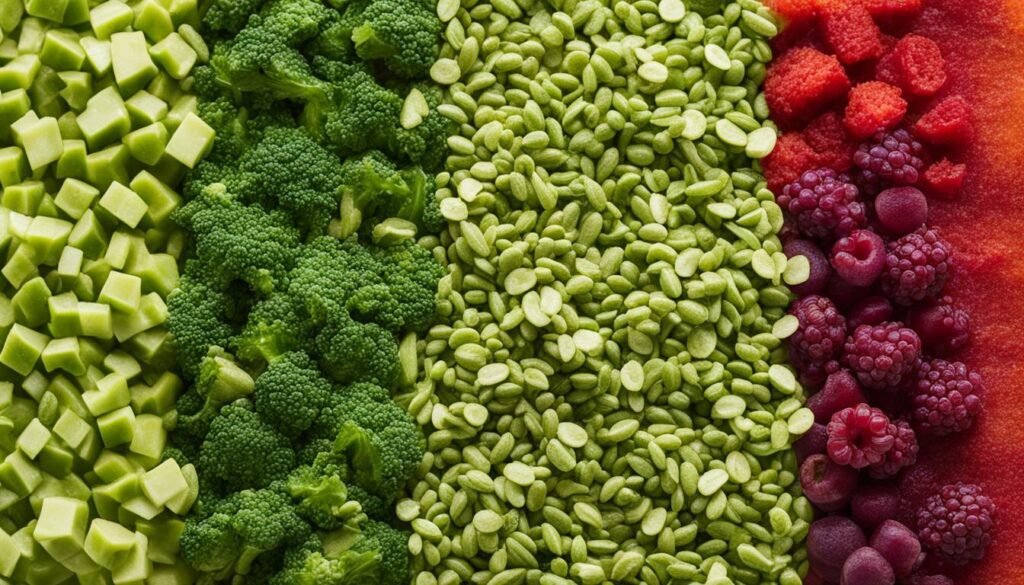“As an Amazon Associate I earn from qualifying purchases.” .
Picture this: it’s a beautiful summer morning, and you’re feeling a bit parched. As you open your refrigerator, your eyes land on that vibrant bottle of Naked Juice that promises a burst of natural goodness. You reach for it, enticed by the colorful fruits and vegetables depicted on the label, expecting a refreshing and healthy sip. But have you ever wondered, is Naked Juice really as healthy as it seems?
Naked Juice has sparked a debate among health-conscious individuals, with opinions varying from its perceived health benefits to concerns about its ingredients. Today, we dive deep into the nutritional facts of Naked Juice, uncovering the truth behind its health claims and shedding light on the controversies surrounding this popular beverage.
Key Takeaways:
- Naked Juice’s high sugar content comes from naturally occurring sugars, making it more of a snack or treat rather than a replacement for whole fruits or a nutritious breakfast.
- The nutritional content of Naked Juice can vary depending on the flavor, with some varieties containing lesser amounts of nutrient-rich ingredients than advertised.
- The Center for Science in the Public Interest (CSPI) has filed a lawsuit against PepsiCo, the parent company of Naked Juice, for misleading health claims on their labels and advertisements.
- Prior legal action has been taken against Naked Juice for labeling products as “all natural” despite containing genetically modified organisms (GMOs).
- While the question of whether Naked Juice is healthy is subjective, it is important to be aware of its ingredients and nutritional content when considering it as part of your diet.
Naked Juice Nutrition Facts
Naked Juice offers a variety of flavors, but have you ever wondered what exactly is in each bottle? The nutrition facts of Naked Juice can vary depending on the flavor, and this has led to accusations of false advertising. Let’s take a closer look at the ingredients and health claims surrounding Naked Juice.
One of the main concerns is that some Naked Juice varieties may contain fruits like apples and oranges, rather than the nutrient-rich ingredients advertised, such as berries, cherries, kale, and other greens. This discrepancy has raised questions about the transparency and accuracy of the brand’s marketing.
“Naked Juice is not a low-calorie food and can contain as much sugar as a can of Pepsi, despite the ‘No Sugar Added’ label.”
Another controversial aspect is the amount of sugar in Naked Juice. Despite the “No Sugar Added” label, Naked Juice is not a low-calorie product. In fact, it can contain as much sugar as a can of Pepsi. This discrepancy between the marketing claims and the actual nutritional content has caused backlash and legal action against the brand.
It’s essential for consumers to be aware of the nutrition facts and ingredients of the products they consume. The controversy surrounding Naked Juice highlights the importance of reading labels and understanding the impact of added sugars on our diets.
Sugar Content in Naked Juice Flavors (per 15.2 oz bottle)
| Flavor | Sugar Content (g) |
|---|---|
| Berry Blast | 45 |
| Mighty Mango | 50 |
| Green Machine | 53 |
| Orange Carrot | 42 |
As the table above shows, many Naked Juice flavors have a high sugar content. It’s important to consider these facts when incorporating Naked Juice into your diet, especially if you are watching your sugar intake or trying to maintain a balanced and healthy lifestyle.
While Naked Juice can still provide some nutritional benefits, it’s crucial to understand the full picture before making a decision. The controversy surrounding Naked Juice raises questions about transparency, accurate labeling, and the impact of added sugars on our health.
The Controversy Surrounding Naked Juice
The Center for Science in the Public Interest (CSPI) filed a class action lawsuit against PepsiCo, the parent company of Naked Juice, for misleading health claims in their advertisements and labels.
The lawsuit accuses PepsiCo of promoting a false perception that Naked Juice contains mostly “super nutrients” like kale, when in reality, it primarily contains cheaper and less nutritious ingredients like apple and orange juice.
PepsiCo has denied these claims and stated that the fruit and vegetables in their juices are clearly identified on the labels.

Previous Legal Action Against Naked Juice
This is not the first time Naked Juice has faced legal action. In a previous class action lawsuit, it was claimed that some of the drinks contained genetically modified organisms (GMOs), despite being labeled as “all natural.”
PepsiCo settled the lawsuit for $9 million and clarified that the “all natural” claim referred to the fruits and vegetables in the bottle, not added vitamin boosts.
The company has also stated that all non-GMO claims have been verified by an independent third party.

The Ingredients Controversy
The controversy surrounding the ingredients of Naked Juice stems from allegations that some of the products contain GMOs.
- Despite being labeled as “all natural,” Naked Juice was found to contain genetically modified organisms.
- PepsiCo settled a class action lawsuit for $9 million regarding these claims.
Independent Verification
In response to the lawsuit and allegations, PepsiCo has reassured consumers that all non-GMO claims have been verified by an independent third party. This verification aims to provide transparency and instill trust in the brand.
The Importance of Authenticity
Accurate labeling and transparency are crucial when it comes to consumer trust. The legal action against Naked Juice highlights the significance of brands delivering on their promises and providing customers with honest information about the ingredients used in their products.
The Verdict on Naked Juice
The controversy surrounding Naked Juice raises questions about transparency and accurate labeling. While some people enjoy the taste of Naked Juice, it is important to be aware of the ingredients and nutritional content. Naked Juice may not be as healthy as it appears due to its high sugar content and misleading health claims. Consumers should carefully consider their personal health goals and preferences when deciding whether to include Naked Juice in their diet.
The Importance of Transparency and Labeling
When it comes to making informed choices about our health, transparency and accurate labeling are essential. The controversy surrounding Naked Juice serves as a reminder that what is advertised on the label may not always align with the actual contents of the product. It’s crucial to read the nutrition facts and ingredient list carefully to understand what we are consuming.
“Consumers should be able to trust the claims made by food and beverage companies. However, the Naked Juice controversy highlights the need for greater transparency in the industry. It’s important for companies to accurately represent their products and provide clear information for consumers to make informed decisions about their health.”
– Dr. Sarah Johnson, Nutrition Expert
High Sugar Content and Misleading Claims
One of the main concerns with Naked Juice is its high sugar content. While the sugar in Naked Juice is naturally occurring, it can still contribute to excess sugar intake, especially when consumed in large quantities. This can have negative effects on overall health, such as an increased risk of obesity, diabetes, and other health conditions.
Furthermore, the health claims made by Naked Juice can be misleading. The company has faced legal action for promoting the idea that their juices contain primarily “super nutrients” like kale, when in reality, they primarily contain cheaper and less nutritious ingredients like apple and orange juice. This discrepancy between marketing and reality is a cause for concern.
Consumer Considerations
While the controversy surrounding Naked Juice raises valid concerns, it’s important to remember that individual opinions and experiences may vary. Some people may enjoy the taste of Naked Juice and find it convenient for on-the-go consumption. However, it is crucial to make informed decisions about our health and consider our personal health goals and preferences.
If you choose to include Naked Juice in your diet, it’s essential to do so in moderation and as part of a balanced overall eating pattern. Whole fruits and vegetables should still be prioritized for their nutrient density and fiber content. Consulting with a healthcare professional or registered dietitian can also provide personalized guidance based on your specific needs and goals.
Ultimately, the verdict on Naked Juice is up to the individual consumer, taking into account the facts, opinions, and reviews available. Being well-informed and mindful of our choices is the key to making the best decisions for our health and well-being.
Conclusion
The question of whether Naked Juice is healthy is subjective and depends on individual perspectives and dietary needs. While Naked Juice may provide convenience and some nutritional benefits, it is not a substitute for whole fruits and vegetables.
The controversies surrounding its ingredients and marketing practices highlight the importance of reading labels and being informed about the products we consume. It’s recommended to consult with a healthcare professional when considering changes to your diet for personalized advice.
In conclusion, naked juice offers a convenient option for those looking to incorporate fruits and vegetables into their diet. However, it’s crucial to be aware of the high sugar content and the potential disparity between advertised ingredients and actual composition. By staying informed and making informed choices, individuals can prioritize their health and well-being.
FAQ
Is Naked Juice considered healthy?
What are the nutrition facts of Naked Juice?
What is the controversy surrounding Naked Juice?
Has Naked Juice faced legal action?
What is the verdict on Naked Juice?
What is the recommended approach when considering Naked Juice?
“As an Amazon Associate I earn from qualifying purchases.” .



